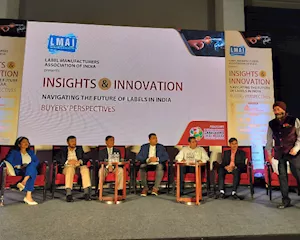Frankfurter Buchmesse offers a chance to promote India as a print destination - The Noel D'Cunha Sunday Column
Recently, Juergen Boos, president and CEO of the Frankfurt Book Fair, was in India, where, among other engagements, he met the Indian book publishing leaders in several meetings in New Delhi, Mumbai and Chennai.
In a conversation with Noel D’Cunha, Boos explains how the Frankfurt Book Fair can help the Indian printing-publishing community
13 Apr 2018 | By Noel D'Cunha
How would you judge your recent trip to India?
It was my first trip to India after many years and, I have to say, it was a great visit. So much is happening in India right now in terms of domestic consumption of print and video content. There was also a significant international presence at the Frankfurt Book Fair where some 90 Indian companies showcased some innovations in children’s publishing and technology services.
The Indian publishing and printing ecosystem is growing rapidly. I noticed that the questions and topics discussed at our meetings within the publishing industry were very different than they were during my last trip here. I also noticed greater competition within the sector. All in all, it’s exciting to see this dynamic.
For me, it was also good to get some feedback about Frankfurter Buchmesse, to hear what our customers based in India think and what they need from a global forum like Frankfurt Book Fair in order to successfully conduct their business.
Exhibitors and visitors come to Frankfurt to build networks, increase their visibility and learn from the trends highlighted and discussed at conferences like The Markets, at the Business Club and at The Arts+, which is precisely what we aim to facilitate at the book fair. It was extremely valuable for me to be in touch with Indian service providers and printers, to see how active they are and to understand how they do business. I would love to see more of that showcased in Frankfurt.
According to the Indian Book Market Report, the book numbers for 2015 were Rs 32,000-crore. That’s the size of the Indian book market, 94% of which consists of textbooks. In light of this, could you share the key takeaways from your interactions with publishers in Delhi?
Innovative thinking and enthusiasm have always characterised Indian businesses in general, and I can see the influence of a new breed of hybrid and tech-enabled publishing on the country’s publishing sector. India is a dynamic market due to the phenomenal increase in the number of mobile internet users. Again, eCommerce and content consumption are showing double-digit growth.
With 300 million smartphone users and the world’s second-largest data consumption market, India offers the right ecosystem for this market to evolve. The climate encourages a culture of entrepreneurship, as initiatives like ‘Make in India’ demonstrate.
However, while the education market is the dominant sector worldwide, what I’m really enthusiastic about is Indian writing in English, as well as the robust Indian-language publishing sector. We hope to see India represented more strongly in Frankfurt and are happy to provide support to make that happen.
Today, India is the first choice when it comes to outsourcing design and pre-media. Reports say 66% of major publishers outsource their work to India. What was your impression from meeting with pre-media firms in Chennai?
My impression is that the pre-media companies are all very active and that much of their activity is part of an international business strategy, as you mentioned. Eastern Europe seems to be a new market; one of the people I met had just opened an office in Romania. I also heard that these companies would like to have more contact with production companies in Frankfurt, so we will try to help guide them in the right direction.

What can the CEOs of Indian print companies (exhibitors as well as visitors) expect from the book fair in Frankfurt?
The Frankfurter Buchmesse continues to be the key place for international publishers and service providers to come together to buy and sell rights, discuss challenges in their markets and find solutions, and to grow their network of business contacts. We are proud of the number of countries represented at the book fair and of how it continues to help attendees expand their business.
What trends do you see in publishing worldwide?
The emphasis on rights continues to grow, with publishers focusing on expanding to new countries. Our conference The Markets provides inside information about each market to help publishers gain a foothold in markets they might not yet know very well.
Blockchain is starting to take hold in the publishing world. For the past two years, our The Arts + programme has featured discussions about blockchain and how it is being used to authenticate artwork and to provide secure transactions. This past year, publishers have begun to see how blockchain can help improve the tracking of rights information and secure deals.
The Indian publishing industry follows the markets in the US, UK and Europe. But what trends you are seeing in the Philippines and Australia, as well as in ASEAN and North African countries?
We only started taking a closer look at the countries in Southeast Asia a few years ago. In 2015, Indonesia was our first Guest of Honour country from Southeast Asia, opening a door to that region.
You mentioned earlier that textbooks represent the biggest market share in India. That is certainly also true in ASEAN countries, as well as in North Africa. These countries – Vietnam and Thailand in particular – are also huge rights buyers, acquiring rights primarily from English-speaking countries. In some of these countries, translations account for up to 80% of all book production.
At the same time, ASEAN countries are also becoming increasingly active in selling their own content to other countries. Here, once again, Indonesia’s presence as Guest of Honour in Frankfurt was a starting point. The book fair was one of the first major cultural events Indonesian publishers participated in outside Asia and, as a result, they closed an impressive number of rights deals.
Traditionally, there have been very few exchanges between the various countries in Southeast Asia. But this is also changing, with more and more rights being sold and acquired between them. However, piracy and copyright issues continue to be major challenges in Southeast Asia. Like India, Southeast Asia is quite advanced when it comes to technical development – the internet is growing quickly and mobile content consumption is very popular.
Southeast Asia’s young population (about 50% of the region’s population is below the age of 30 years) is tech-savvy. While reading printed books is not their first priority, education is becoming increasingly important. So there are many opportunities; a lot depends on the political framework.
Are there any plans for special India workshops and matchmaking sessions, as was brought up at the roundtable with publishing CEOs in Mumbai?
A successful presence at the book fair in Frankfurt involves a three-part process comprising of preparation, presentation and follow up. We have begun to interact with the Federation of Printers in India and I’m pleased to hear that they would like to highlight India as a print destination. Our office in New Delhi is working closely with them to help develop an agenda for the upcoming Frankfurter Buchmesse. We look forward to a sustained collaboration with India and welcome the country’s active participation in Frankfurt.
Could you please list three key opportunities for Indian printers at the Frankfurter Buchmesse?
Stated very briefly, the book fair offers the chance to promote India as a print destination by launching a campaign, showcasing its publishing capabilities and competence, and exploring international markets to build a network of potential customers around the world.

Frankfurter Buchmesse 2018
To be held from 10 to 14 October 2018, Frankfurter Buchmesse is all about books, exciting topics and captivating content for the international publishing and media industry and for book fans from around the world. This year will mark the 70th edition of the fair. It is the most important international trading post for content, the centre of the media world and a major cultural event. This year's Guest of Honour, Georgia, invites visitors to discover its diverse literary and cultural heritage.
The Markets is the pre-fair conference of the Frankfurter Buchmesse, providing publishing professionals with unique, first-hand knowledge of new and emerging areas and regions of business in publishing. It is where top market performers meet and exchange their secrets to success.
The Business Club connects participants to relevant networks, career-changing knowledge and productivity-enhancing services. In the recent years, the Business Club has established itself as the best kept ‘open secret’ to success in Frankfurt. In 2017, 4,500 guests from 53 countries benefited from the professional programme and services offered by the business platform. Over 90% of the attendees felt the Business Club met their expectations.
The internationalisation of the publishing sector continues to accelerate rapidly, a fact reflected in the strongly cosmopolitan networking pursued at the Frankfurter Buchmesse. To enhance this network throughout the year, the Frankfurter Buchmesse organises more than 40 international conferences and events, drawing on the expertise of its strong international team, both in Frankfurt and in the German Book Offices (GBO) and Book Information Centres (BIZ) abroad.
The Arts+ is the platform that brings together representatives of the culture and creative industries and innovative players from the technology sector. It is these individuals who, together, with the help of digital technologies and new business models, are shaping the future. Architects, fashion designers, photographers, curators and publishers – all create and curate unique content that can be exploited even more effectively through the use of new media. The 2018 edition will focus on the main topic of Cultural Heritage.














 See All
See All